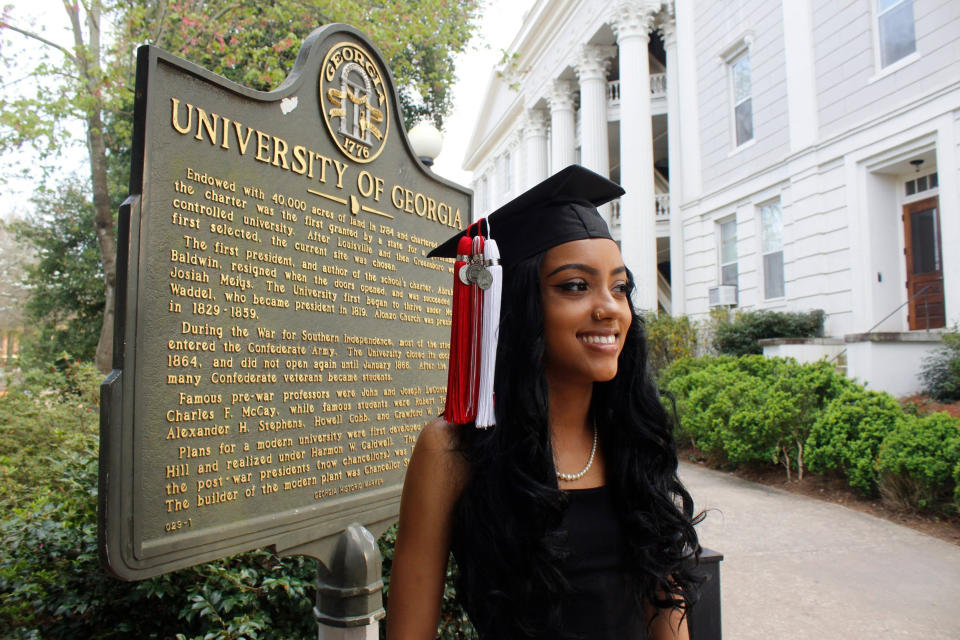Colleges are revoking admissions offers due to hate speech
As Black Lives Matter protests continue across the country, at least a dozen schools have rescinded student admissions offers over racist social media posts.
Marquette University revoked an acceptance after an incoming lacrosse player trivialized George Floyd’s death. One high school valedictorian lost her spot at the University of Florida after she admitted to being a "racist person" and called two Black classmates "crackwhores." And a Cornell University football recruit will have to find somewhere else to play after he was caught on video using a racial slur.
A prospective student who posted racist comments in social media will not be joining the University of Florida community this fall.
— FLORIDA (@UF) June 9, 2020
Many education officials believe rescinding college offers is a necessary consequence of such blatantly racist behavior. Others — including some Black social justice leaders — caution that schools might be missing out on an opportunity to help these young adults learn empathy and grow as human beings.
Watch TODAY All Day! Get the best news, information and inspiration from TODAY, all day long.
Kyla Brinkley, a University of Georgia graduate who said she endured racist behavior from a white sorority sister, is glad the bad apples are being weeded out.
"I think it's important that people understand that there are repercussions," Brinkley, 24, told TODAY Parents. "Even if you apologize and say you didn't mean it, it's still something you at one point believed."

Christian Picciolini, a former neo-Nazi who spent eight years as a member of a violent skinhead group, is an example of how people can change and grow. Picciolini now helps people leave extremist groups through his organization, The Free Radicals Projects, and his book, "Breaking Hate."
“There’s this cancel culture going on right now,” Picciolini told TODAY Parents. “But with college, if we take away their opportunity to learn and evolve, we’re kind of sentencing them to be stuck there. They need guidance. Hate is learned, so it can be unlearned."

Picciolini said he understands that schools want to keep their students safe.
"I get that," he said. "But if the student hasn't committed a violent act, are we policing thought too much without offering an opportunity to change?"
Tiffany Dena Loftin, director of the NAACP Youth & College Division, said reversing admissions offers can be a fine short-term solution, but she notes that racist posts are a symptom of larger problems that need to be addressed.
“I do think that a precedent needs to be set that it’s not OK to mock George Floyd on social media or to use the N-word,” Loftin told TODAY Parents. “But there are institutional problems. There are systemic problems. And I don’t think that reversing college admissions gets to solving or answering any of those issues.”
Loftin noted that the person behind the racist post likely will find another school to attend.
“Rescinding an offer does not fix or teach the student anything,” she explained. “Until we address racism at the root, all the other things we are doing are just Band-Aids.”
When Missouri State University President Clif Smart learned about racist social media posts shared by two incoming students, he said he initially wanted to rescind their offers. He eventually changed his mind. (The students chose to withdraw from the university anyway.)
“We cannot expect or require that students come to us fully formed, possessing all of the skills and characteristics that exemplify Citizen Scholars,” Smart wrote in a blog post explaining his decision last month. “It is our job and our duty to help them develop these traits through education and exposure. ...
“We had planned to allow them to join our campus community in the fall, knowing that this decision would be ridiculed, questioned and second-guessed. But it was under the conditions that they participate in additional education and training.”
Clay Calvert, a professor of law and journalism at the University of Florida, noted that while the First Amendment gives you the right to speak freely, it doesn’t give you the right to attend a public university.
“Certainly these students are entitled to say what they want," Calvert told TODAY Parents. “(But) the right of institutional academic freedom encompasses the right of a university to choose the students that it feels are going to be best suited for joining its community of scholars."
Picciolini said that he's seen several apologies where students simply chalked the racist behavior up to being young and stupid.
"Don't defend your bad behavior. Take ownership of it and find ways to repair it," Picciolini said. "Prove it, not in your words, but in your actions. I've been doing that for 25 years."
Related video:

